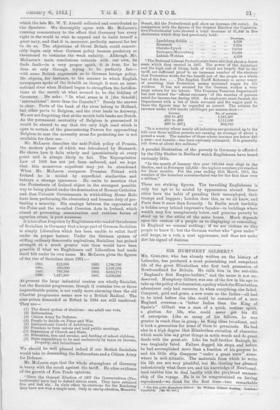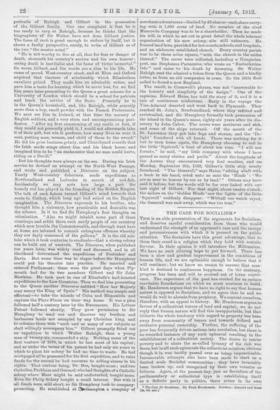SIR HUMPHREY GILBERT.*
MR. GOSLING, who has already written on the history of Labrador, has produced a most painstaking and competent life of the great Elizabethan who first took possession of. Newfoundland for Britain. Ho calls him in the sub-title "England's first Empire-builder," and the name is not un- deserved. Humphrey Gilbert was one of the few in his age to take up the policy of colonization, a policy which the Elizabethan adventurer only had recourse to when everything else failed. Conquest, gold and gems, a new route to the Indies—all had. to be tried before the idea, could be conceived of a new, England overseas—a "better Indies than the King of, Spain's." Gilbert was a man of a quick, restless spirit, a glutton for life, who could never get his fill, of enterprise. Like so many of his fellows, he was greater in reach than in grasp ; he flung ideas broadcast, and it took a generation for some of them to germinate. He bad also in a high degree that Elizabethan elevation of character. which made him say great things in noble words and do great, deeds with the great air. Like his half-brother Raleigh, he was tragically fated. Failure dogged his steps, and before he had accomplished more than a fraction of his purpose he and his little ship disappear " under a great ware " some. where in mid-Atlantic. The materials from which to write his life are not very plentiful, but Mr. Gosling has gleaned industriously what there are, and his knowledge of Newfound- land enables him to deal lucidly with the perplexed seaman- ship of the voyage. He is to be congratulated on having, reproduced—we think for the first time—two remarkable • The Life of Sir Humphrey Gilbert. By William Gilbert Gosling. London
Constable. ed. net.]
portraits of Raleigh and Gilbert in the possession of the Gilbert family. Our one complaint is that he is too ready to carp at Raleigh, because he thinks that the biographers of Sir Walter have not done Gilbert justice. The fame of each is great enough to endure by itself, but it shows a faulty perspective, surely, to write of Gilbert as of the two "the master mind."
"He is not worthy to live at all, that for fear or danger of death, shunneth his country's service and his own honour ; seeing death is inevitable and the fame of virtue immortal."
So wrote Gilbert, and the words are a clue to his life. He came of proud West-country stock, and at Eton and Oxford acquired that tincture of scholarship which Elizabethan cavaliers prized. They made him an admirable writer, and gave him a taste for learning which he never lost, for we find him years later presenting to the Queen a great scheme for a University of London which should be a school for patriots and teach the service of the State. Presently he is in the Queen's household, and, like Raleigh, while scarcely more than a boy, smelt powder with the French Protestants.
We next see him in Ireland, at that time the nursery of English soldiers, and a very stern and uncompromising paci- ficator. "After my first summoning of any castle or fort, if they would not presently yield it, I would not afterwards take it of their gift, but win it perforce, how many lives so ever it cost, putting man, woman, and child of them to the sword." He did his grim business grimly, and Churchyard records that the Irish made songs about him and his black horse, and imagined him to be "an enchaunter that no man could hurte, riding on a Devill."
• But his thoughts were always on the sea. During his Irish service he devised an attempt on the North-West Passage, and wrote and published a Discourse on the subject. Yearly West-country fishermen made expeditions to Newfoundland and Labrador in search of cod-fish. Incidentally we may note how large a part the homely cod has played in the founding of the British Empire. The talk of such fishers turned Gilbert's mind towards that route to Cathay, which long ago had seized on the English imagination. The Discourse expounds to his brother, who thought him a visionary, how practicable and desirable was the scheme. In it we find Sir Humphrey's first thoughts on colonization. "Also we might inhabit some part of these countreys and settle there such needy people of our countrey which now trouble the Commonwealth, and through want here at home are inforsed to commit outragious offences whereby they are dayly consumed of the gallows." It is the old mis- take which it took centuries to eradicate—that a strong colony can be built out of wastrels. The Discourse, when published ten years later, was widely read and discussed, and in all likelihood determined the expeditions of Frobisher and Davis. But some time was to elapse before Sir Humphrey could put his theories into practice. He married and entered Parliament : these were the great days when Ply- mouth had for its two members Gilbert and Sir John Hawkins. He took part in one of Elizabeth's half-hearted expeditions to the Low Countries. Then we find him presenting to the Queen another Discourse entitled " How her Majesty may annoy the King of Spain." His method was simple and effectual—to take the islands of Cuba and Hispaniola and capture the Plate Fleets on their way home. It was a plan followed half a century later by the Buccaneers. His Letters Patent followed shortly. They gave permission to Sir Humphrey to send out and discover any heathen and barbarous lands not occupied by any Christian king, and to colonize them with " such and as many of our subjects as shall willingly accompany him." Gilbert promptly fitted out an expedition in which Walter Raleigh, then a young man of twenty-six, commanded a ship. Nothing came of the first venture of 1578, in which he lost most of his capital; and as under the terms of his patent he had only six years in which to plant his colony he bad no time to waste. He had mortgaged allhe possessed for his first expedition, and to raise fends for the second he had recourse to selling shares in his rights. That curious being, Dr. Dee, bought some ; and two Catholics, Peckham and Gerrard, who had thoughts of a Catholic colony where Mass might be said undisturbed, bought more. Even Sir Philip Sidney bought a small interest. But with it all funds were still short, so Sir Humphrey took. to company- promoting. He established at Cauthampton a company of merchant-adventurers—limited by f.5 shares—each share carry- ing with it 1,000 acres of laud. No member of the rival! Muscovite Company was to be a shareholder. Then he made• his will, in which lie set out in great detail the whole internal organization of his new colony, site still unknown. He framed land laws, provided for law-courts, schools, and hospitals,. and an elaborate established church. Every country parish was to be three miles square, " with the church in the midst thereof." The crews were collected, including a Hungarian poet, one Stephanus Parmenius, who wrote an "Embarkation Ode " and came to his death by drowning. Sir Walter- Raleigh sent the admiral a token from the Queen and a kindly letter, as from an old companion in arms. So the little fleet sailed to found a new England.
The result, in Cromwell's phrase, was not "answerable to, the honesty and simplicity of the design." One of the Edward Haies, has told the story of it, and it is a tale of continuous misfortune. Early in the voyage the Vice-Admiral deserted and went back to Plymouth. They reached St. John's, Newfoundland, where they refitted and' reviotualled, and Sir Humphrey formally took possession of the island in the Queen's name, eighty-six years after its dis- covery by John Cabot. The crews were mutinous and sick,. and some of the ships returned. Off the mouth of the- St. Lawrence they got into fogs and storms, and the De- light ' foundered with all hands. There was nothing for it but to turn home again, Sir Humphrey choosing to sail in the little 'Squirrell,' a boat of about ten tons. "I will not forsake," he said, " my little company with whom I have so many storms and perils." About the longitude of the Azores they encountered very foul weather, and on Monday, September 9th, 1583, Gilbert's little ship nearly foundered. " The Generall," says Haies, " sitting abaft with a book in his band, cried unto us unto the Hinde :
are as near to heaven by sea as by " Others may have said it before, but the words will be for ever linked with out- last sight of Gilbert. For that night, about twelve o'clock,. the sailors on the ' Golden Hinde 'saw the lights of the little Squirrell ' suddenly disappear. " Withall our watch cryed,. the Generall was cast away, which was too true."



















































 Previous page
Previous page